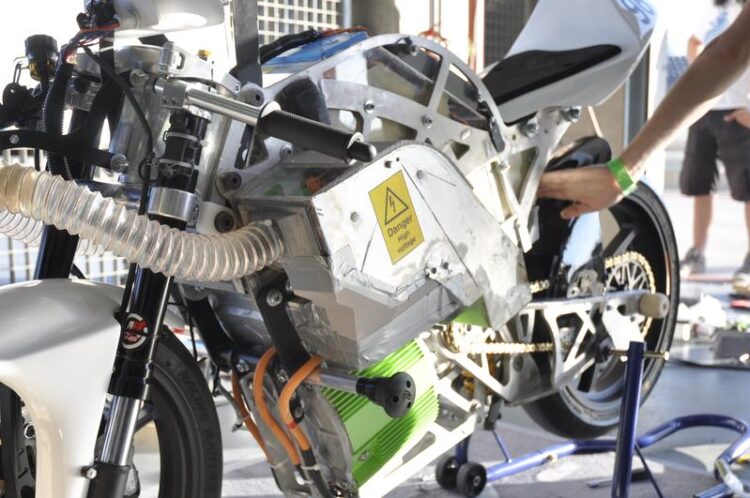“Hydrocycle” – The Motorcycle for the Hydrogen Age

The project partner ČVUT already has substantial experience in the construction of motorcycles with alternative propulsion systems.
(c) ČVUT Czech Technical University
If 1 kilogram of hydrogen allows for approximately 100 kilometers of range in a car, a hydrogen tank for an electric motorcycle can also fit within the limited space of its design. A more challenging task is integrating a complete fuel cell system (which converts onboard hydrogen into electrical energy) into the frame construction. A German-Czech consortium of research institutions and manufacturing companies is now taking on this challenge: By the end of 2025, they will construct a fully functional motorcycle as a demonstrator that complies with the strict European approval standards and certification requirements.
The hydrogen-powered bike aims to serve as inspiration for the future of mobility. Due to its agility and compactness, the two-wheeler is of interest to urban delivery services and package couriers. It enables CO2-neutral mobility and contributes to the reduction of noise emissions. The advantage over battery-electric solutions is in the higher range with shorter refueling times.
Division of Labor
In the Hydrocycle project, Czech partners are working on vehicle development, advancing work packages related to vehicle structure, ergonomics, and packaging (fitting the technology into the available space). German project partners are focusing on the powertrain. The fuel cell stack from WätaS Wärmetauscher Sachsen GmbH serves as the basis for the propulsion system; Fraunhofer IWU supports he development of new manufacturing technologies and the improvement of stack functionalities with the Reference Factory.H2. The Chemnitz research institute is also responsible for system dimensioning and packaging. And the IWU is in charge of ensuring a smooth interface between vehicle and fuel cell system development.
Project Background
Hydrocycle aligns with the European Union’s hydrogen strategy. EU regulations envision a significant role for hydrogen from renewable sources in the transportation sector from 2030 onwards, aiming for the Union to become climate-neutral by 2050. The project partners, Fraunhofer IWU, WätaS Wärmetauscher Sachsen GmbH (Olbernhau), 1to1design (Prague), Czech Technical University (ČVUT, Prague), and ÚJV Řež (Husinec), are responding to a call for joint Czech-Saxon projects in the sustainable mobility and transportation systems for people and goods sector.
Wissenschaftliche Ansprechpartner:
Stefan Lohberger
Fraunhofer Institute for Machine Tools and Forming Technology IWU
Reichenhainer Str. 88
D-09126 Chemnitz
Phone +49 371 5397-1109
Stefan.Lohberger@iwu.fraunhofer.de
Originalpublikation:
https://www.iwu.fraunhofer.de/en/press/PM-2024-Hydrocycle-the-Motorcycle-for-the…
Media Contact
All latest news from the category: Transportation and Logistics
This field deals with all spatial and time-related activities involved in bridging the gap between goods and people, including their restructuring. This begins with the supplier and follows each stage of the operational value chain to product delivery and concludes with product disposal and recycling.
innovations-report provides informative reports and articles on such topics as traffic telematics, toll collection, traffic management systems, route planning, high-speed rail (Transrapid), traffic infrastructures, air safety, transport technologies, transport logistics, production logistics and mobility.
Newest articles

First-of-its-kind study uses remote sensing to monitor plastic debris in rivers and lakes
Remote sensing creates a cost-effective solution to monitoring plastic pollution. A first-of-its-kind study from researchers at the University of Minnesota Twin Cities shows how remote sensing can help monitor and…

Laser-based artificial neuron mimics nerve cell functions at lightning speed
With a processing speed a billion times faster than nature, chip-based laser neuron could help advance AI tasks such as pattern recognition and sequence prediction. Researchers have developed a laser-based…

Optimising the processing of plastic waste
Just one look in the yellow bin reveals a colourful jumble of different types of plastic. However, the purer and more uniform plastic waste is, the easier it is to…



